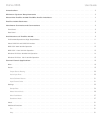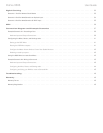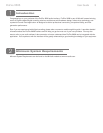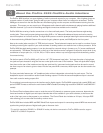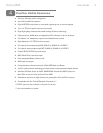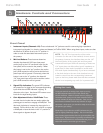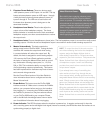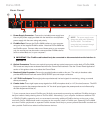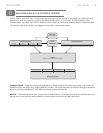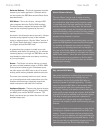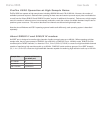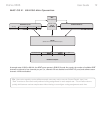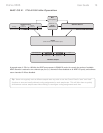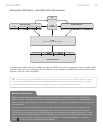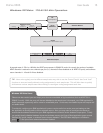
User Guide 4ProFire 2626
About the ProFire 2626 FireWire Audio Interface
The ProFire 2626 interface is a super-highway of audio inputs and outputs for your computer. Like a highway, there are
a certain number of “audio lanes” going to and from your computer—these “lanes” are referred to as streams. ProFire
2626 gets its name from the fact that there are 26 streams going into the computer and 26 streams returning from the
computer. This means you can record up to 26 separate audio channels while simultaneously playing back an additional
26 audio channels if you use all of the analog and digital connections available on the interface.
ProFire 2626 has a variety of audio connections on its front and back panels. The back panel features eight analog
combo jacks. These multi-purpose jacks accept either XLR or 1/4” balanced/unbalanced inputs and can be used to
record microphone or line-level sources. The eight XLR inputs are routed to preamps featuring the same technology found
in the award-winning M-Audio Octane with controls for gain, phantom power, and 20dB pad on the front panel.
Next to the combo jacks are eight 1/4” TRS line-level outputs. These balanced outputs can be used in a number of ways
including monitoring the outputs of your audio software or sending tracks to an external mixer or effects processor. Since
ProFire 2626 has eight analog outputs, it can also be used for surround mixing in formats up to 7.1 (seven satellites and
one subwoofer). The Master Volume knob on the front of the interface can be configured to adjust the output level of any
combination of output pairs (i.e., 1/2, 3/4, 5/6, or 7/8) for stereo mixes or up to all eight outputs simultaneously—perfect
for surround mixing.
On the front panel of ProFire 2626, you’ll find two 1/4” (TS) instrument input jacks. You have the option of using these
two jacks as inputs instead of using the first two combo jacks on the rear of the interface. These two jacks differ slightly
from those on the rear of the interface since they are optimized for instrument-level signals and can be used to record
the direct output of an electric guitar or bass. Like the rear panel XLR connectors, these inputs can also be routed to the
preamps.
The front panel also features two 1/4” headphone jacks with an independent volume knob for each output. The first
headphone output is sourced from audio routed to analog outputs 1/2 while the second headphone output is sourced
from audio routed to analog outputs 3/4.
The remaining inputs and outputs on the interface are for digital signals. ProFire 2626 supports both coaxial (RCA) and
optical S/PDIF formats as well as the multi-channel ADAT standard (including high resolution S/MUX II* and S/MUX IV*
modes).
The Control Panel software allows users to scale the active I/O channels to preserve system resources, determine the
format and number of digital input and output channels that will be available to your audio software, as well as set the
order of the input ports as they appear in your software. The Control Panel also includes an 18-input, 16-output DSP
mixer allowing you to create near-zero latency monitor mixes.
ProFire 2626 also includes MIDI and BNC Word Clock inputs and outputs for connecting external MIDI instruments and
synchronizing multiple pieces of digital audio gear to the same clock.
* To use high resolution S/MUX II or S/MUX IV modes, the device connected to ProFire 2626 must also support
S/MUX II or S/MUX IV operation.
3




